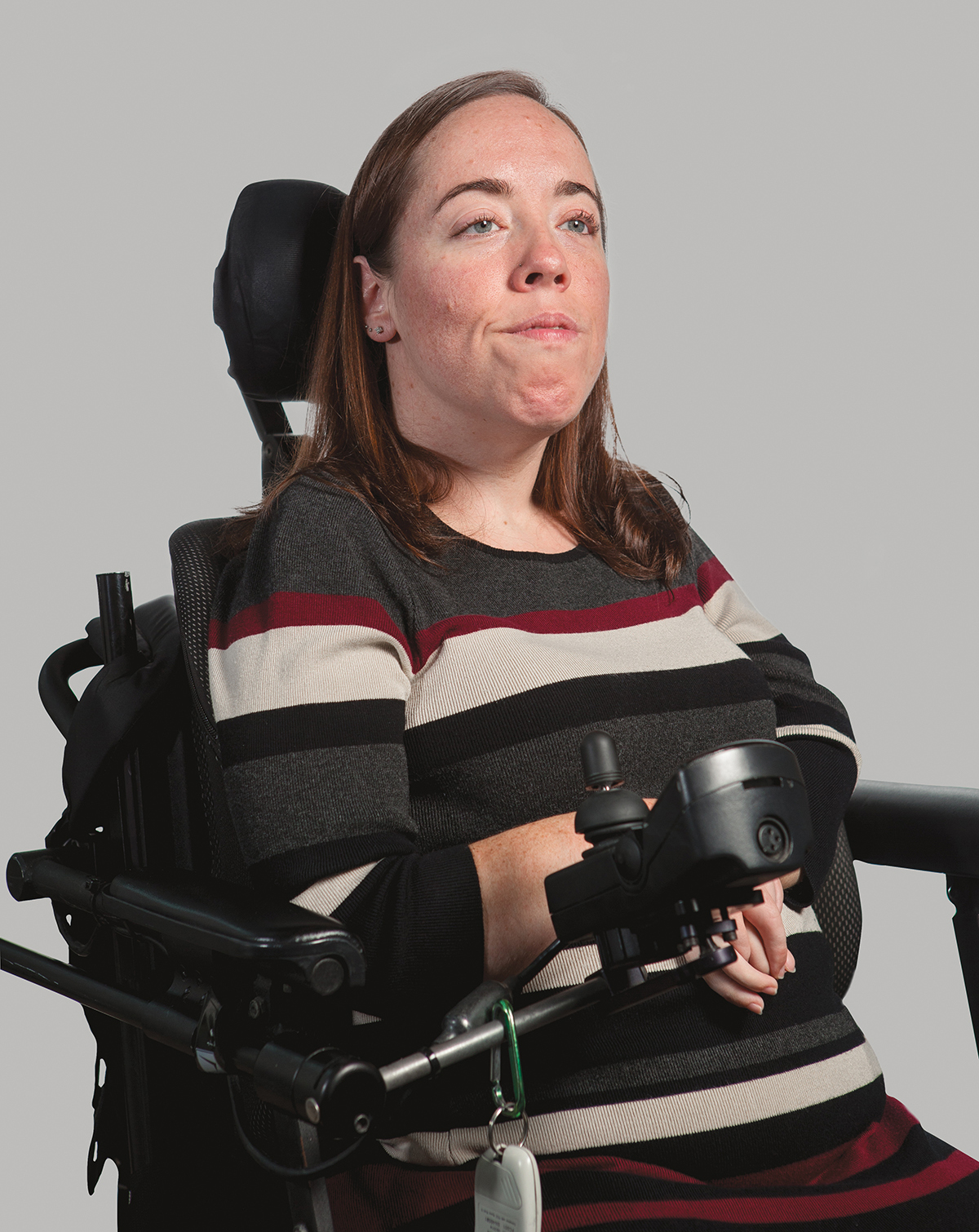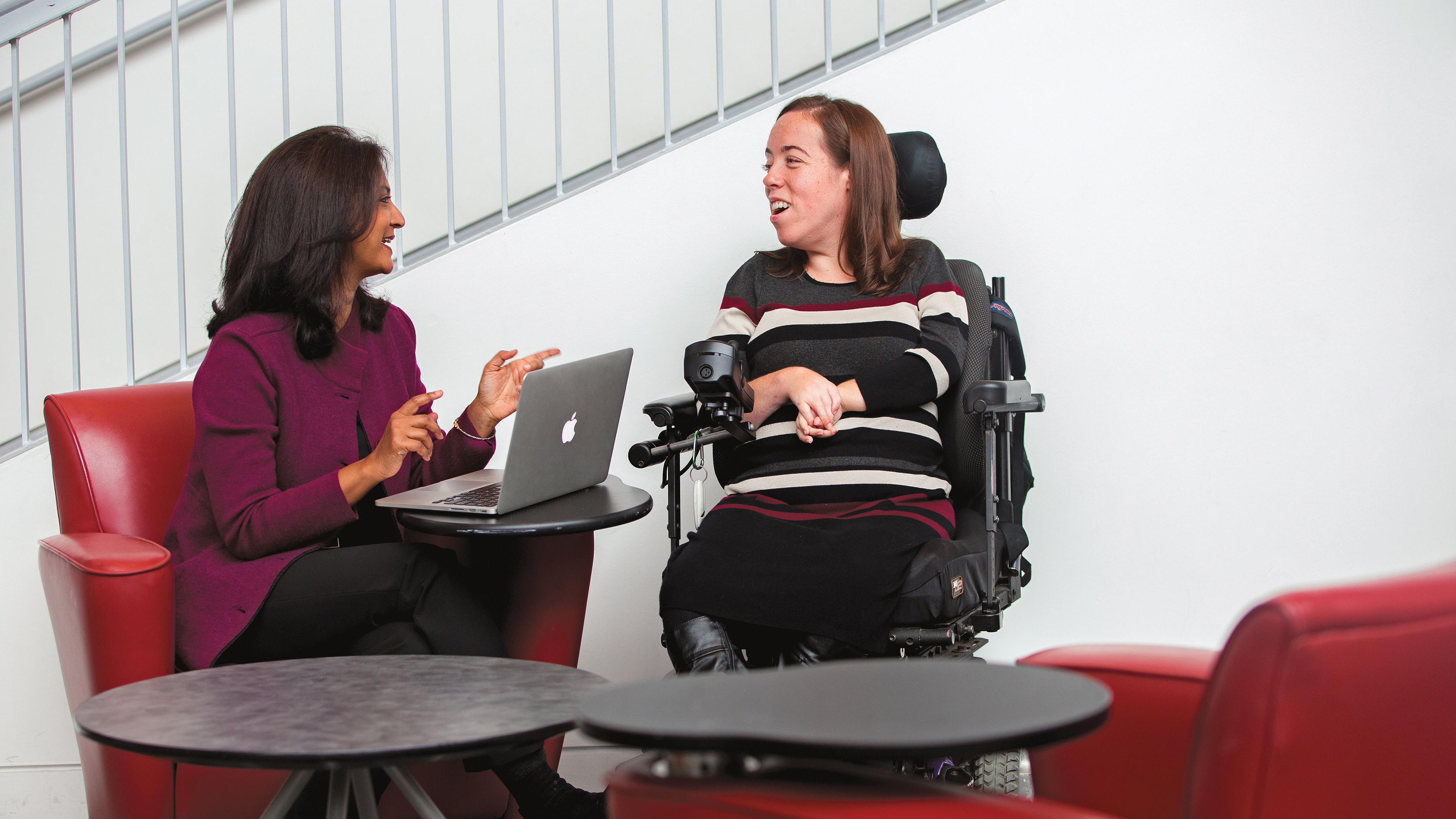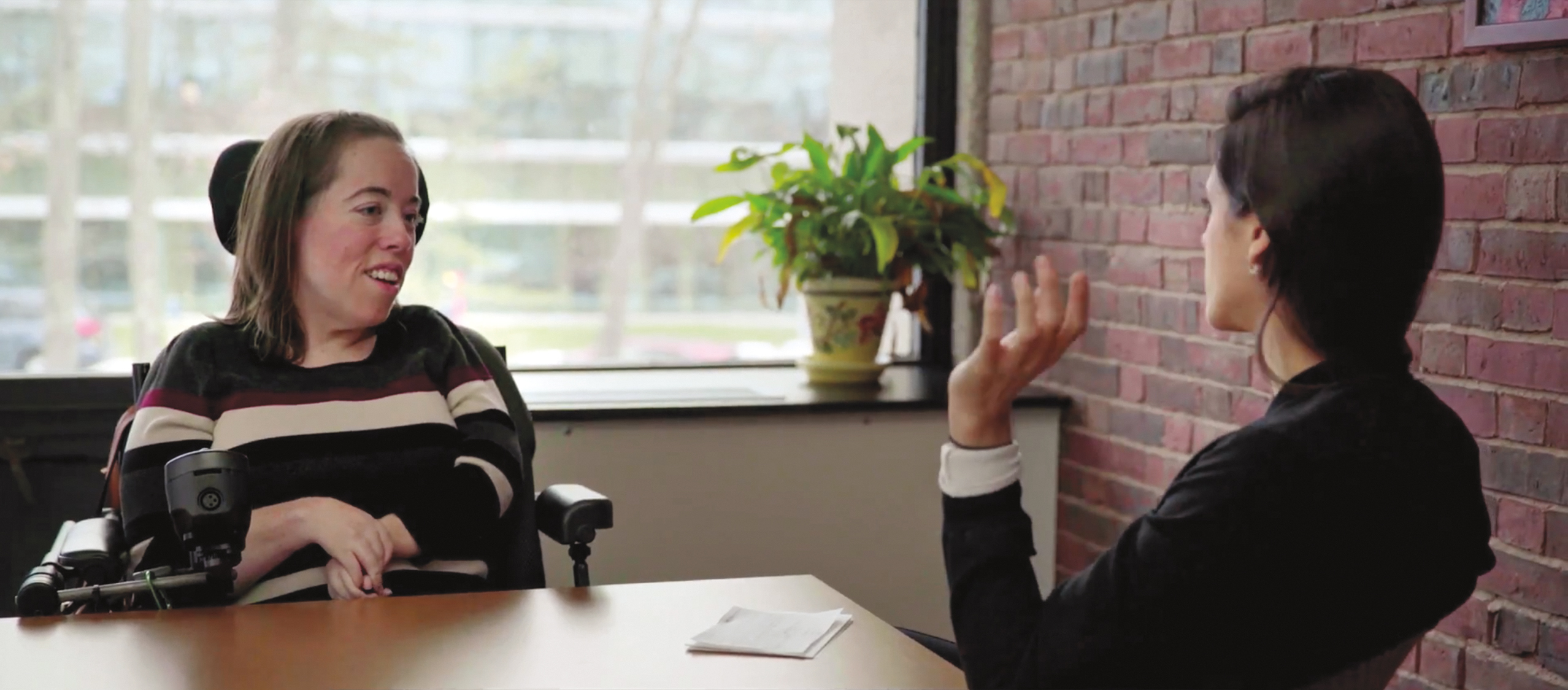By Alix Hackett

As a young attorney working for the National Council on Disability (NCD), Robyn Powell was assigned a project that would determine the trajectory of her career.
Powell, a new hire at the independent federal agency, was charged with researching the issue of parents with disabilities. It was a subject she knew little about, but she couldn’t say no to her first request.
“I didn’t think the issue would be much,” she acknowledged recently. “I figured I’d work on it for six months, write a report that was maybe 50 to 100 pages and be done.”
Instead, Powell spent a year conducting interviews and wading through court cases in an effort to understand the complex world that 4.1 million parents with disabilities in the United States navigate every day. The resulting 445-page report, “Rocking the Cradle,” was released by the NCD in 2012 and lauded for its groundbreaking research and findings.
The report set Powell on the path to becoming one of the country’s foremost experts on the rights of parents with disabilities — she’s since appeared on national news programs, been cited in major journals and spoken at the White House — and marked the beginning of a lifelong quest for justice.
“It happened all by accident,” Powell says, laughing. “I went into this thinking it would be one and done very easily, and I would move on. But I have not moved on at all.”
Becoming an Advocate
Practicing law wasn’t a foregone conclusion for Powell, but advocating for people with disabilities was. Powell was born with arthrogryposis, a rare condition that affects the muscles and joints, and by the time she entered college, she had experienced her fair share of discrimination.
Becoming a social worker felt like the best way to make an impact, so Powell did just that, accepting a job out of college helping adults with intellectual disabilities live more independently. Soon, however, she found herself frustrated by the barriers that continuously prevented her clients from accessing the supports and services they needed.
“I felt like I just kept putting a Band-Aid on everything,” she recalls. “I would fix the problem for one person, and then the next person would have the same problem.”
Within a year, she enrolled in law school, determined to tackle systemic issues at a higher level. After earning her JD from Suffolk University Law School, she signed on as a staff attorney with Greater Boston Legal Services, a nonprofit that provides free legal services to individuals in need. The majority of her clients were people with disabilities.
By the time Powell arrived at NCD, she was well aware of the systemic injustices and stigma that people with disabilities face. Still, when she began investigating issues for parents with disabilities, she was stunned by the lack of research on the topic. Many of the studies that did exist were problematic in their approach, she says.
“A lot of it was really pathologizing disability,” she explains. “It didn’t examine the positive aspects of parenting with a disability, and it didn’t consider that maybe it’s not the parents’ disability that’s causing the negative outcomes but rather the circumstances in which they live: poverty, lack of support, things like that.”
Bent on filling those gaps, Powell decided to pursue her PhD in social policy at Heller, where she’s concentrating in children, youth and families. It was the only school she applied to.
“Heller’s mission of using knowledge to promote social justice is really what I see as my mission,” she says. “I’ve always believed in using research to promote the rights of people with disabilities. If no one else was going to create this research, I was going to.”

Overcoming History
Bias and discrimination against parents with disabilities can be traced back to the eugenics movement of the late 19th and early 20th centuries, which saw the forced sterilization and institutionalization of people deemed “unfit” for parenthood, many of whom had psychiatric, intellectual or physical disabilities. Today, while compulsory sterilization is illegal in most states, the stigma facing parents with disabilities persists.
“People with disabilities are seen as dependents and in need of being taken care of, and therefore unfit to be parents,” says Monika Mitra, director of the Heller School’s Lurie Institute for Disability Policy. “This societal perception creeps into policies and laws.”
Parents with disabilities are at greater risk of losing custody of their children than their non-disabled counterparts, Powell says. In the “Rocking the Cradle” report, she found that removal rates where parents have a psychiatric disability are as high as 70 to 80 percent. When the parent has an intellectual disability, they are 40 to 80 percent. Thirteen percent of parents with physical disabilities have reported discriminatory treatment in custody cases.
In her research, Powell has found that parents with disabilities are penalized disproportionately for needing help with child-rearing tasks, despite the fact that most non-disabled parents have support of some kind, whether it’s day care or carpooling services.
“It takes a village to raise a child, and that’s not a bad thing,” says Powell. “But once you are a parent with a disability, you are held to a much higher standard. The moment you indicate any sort of need for help, it’s automatically viewed as, ‘See? This person can’t raise their child.’”
Since arriving at Heller in 2014, Powell has worked feverishly to increase the body of quality research devoted to parents with disabilities and reproductive health care for disabled women. She works full time as a research associate at the Lurie Institute, where she’s a co-investigator at the National Research Center for Parents with Disabilities, a research and advocacy project. She’s also analyzing 3,400 legal cases as part of her dissertation, which examines how the Americans with Disabilities Act (ADA) has been applied to child welfare cases.
“So far, the ADA has not consistently been used to promote the rights of parents with disabilities,” she contends. “We know that anecdotally, but my purpose is really to try to get some empirical data on that.”
Creating research that could one day influence policies to improve the well-being and health of people with disabilities is at the heart of the Lurie Institute’s mission, says Mitra, who is on Powell’s dissertation committee. She is hopeful that when Powell starts publishing her findings, the impact will be felt in the courtroom.
“This topic is so incredibly important and has the potential to impact the lives of parents with disabilities and their families,” Mitra adds.
Elevating Parents' Voices
Through her research and advocacy, Powell takes pride in elevating the voices and stories of the men and women she is fighting for.
In 2016, she and two other women launched the Disabled Parenting Project (DPP), an online community written by and for parents and prospective parents with disabilities. The website, built with funding from Brandeis’ SPARK Program, features resources and blog posts about adaptive parenting and message boards where parents can ask questions and share tips.
“I kept hearing from parents that they just wanted to connect with other parents, and there’s no real way,” says Powell. “There was no central place for parents with disabilities to gather.”
On one section of the DPP site, how-to photos and videos submitted by readers demonstrate the multitude of creative ways that parents have adapted tasks to accommodate their disabilities, whether it’s changing a diaper from a wheelchair or setting up a nursery while blind. Soon, video interviews featuring parents with disabilities will be added.
The DPP provides a safe community for mothers and fathers with all types of disabilities, as well as information for individuals hoping to become adoptive or biological parents in the future. This inclusive model has proven especially comforting for parents with rare disabilities for whom the feeling of isolation can be most acute.
“Robyn’s cross-disability approach has shown us that we have more in common than we differ,” says Kara Ayers, associate director at the University of Cincinnati Center for Excellence in Developmental Disabilities and co-founder of DPP. “We face many of the same struggles, and we benefit from the same strengths as other families led by parents with disabilities.”
The year DPP was launched, Powell was invited to a White House Forum on the Civil Rights of Parents with Disabilities, where a roomful of researchers, advocates, policymakers and parents with disabilities discussed the issues facing disabled parents, as well as potential solutions. In her remarks, Powell chose to share the story of Sara Gordon, a mother from Massachusetts with an intellectual disability whose child was taken away from her just two days after being born.
“The reason? Gordon had trouble feeding and diapering her newborn — something most new parents struggle with at first,” Powell recounted to the forum audience.
After a legal battle that stretched on for more than two years, the family was reunited.
“It’s heart-wrenching that the family was separated for so long based solely on the presumption that the mother was unfit because she had a disability,” Powell, then an attorney adviser at the NCD, told the “Today” show at the time.
“We need to shift this presumption away from assuming people with disabilities are incapable of raising their children; instead, assume they are [capable]. And then if they need help, we need to provide the support.”
Paradigm Shift
Powell has always known that she wants to become a mother, although her preferred number of children has changed as she’s gotten older.
“I used to think I would have a whole slew of kids,” she laughs. “I was going to have 12, which is totally absurd.”
Not everyone in her life has shared her enthusiasm. By the time she turned 30, Powell’s doctors had offered her a hysterectomy “countless times,” despite her overall good health. When she declined, explaining her desire to have children biologically, the most common reaction was disbelief, she says.
“I basically had to pick their jaws up off the ground because they could not imagine that I would ever want to be a mother,” she remarks.
The fact that this has happened to her, a lawyer living in the state of Massachusetts, has motivated Powell to speak publicly about reproductive rights for women with disabilities. She has led more than 50 trainings for attorneys, social workers and child welfare professionals who work with individuals who might be affected, helping them understand what their clients are likely experiencing.
“I want people to understand that this isn’t something that’s just abstractly happening,” she says. “If it’s happening to me, it’s happening to others.”
During interviews, Powell encourages parents to educate themselves on their rights, particularly if they live in a state that allows courts to terminate parental rights on the sole grounds of physical disability.
“Robyn is committed,” says Ayers. “She’s on a search for justice for people, but she also tries to provide them with tools to get there on their own, which has its own value.”
Inspiring the Next Generation
When Powell completes her PhD, which she hopes to do in the next year, she’ll rejoin a growing number of law professionals who are choosing to represent parents with disabilities and advocate against outdated and discriminatory policies. It’s a stark contrast from her experience as a law student, when disability was hardly mentioned as a potential legal issue.
“I don’t think it came up once,” she says.
Although she remains fully focused on achieving equality for parents with disabilities, Powell credits Heller with expanding her worldview when it comes to social justice issues.
“People with disabilities don’t live in a vacuum, and they’re not all cisgender white men,” she says. “Being at Heller has helped me look at issues around gender equality and racism and sexism, and how that affects people with disabilities.”
Eventually, Powell hopes to continue her research while inspiring a new generation of advocates as a professor of disability law. Already, she’s experienced the thrill of watching her students evolve their understanding of disability rights at Boston University, where she is an adjunct instructor.
“You can see it from the first class to the last class how they’ve changed, and I think that’s so important,” she says. “If I can make a change in some people and how they view disability, I think that the rights of people with disabilities will be greatly improved. In fact, I’m sure of it.”

